2025届高三英语二轮复习 读后续写 穿工装的爸爸让我转耻为荣课件(共20张)
文档属性
| 名称 | 2025届高三英语二轮复习 读后续写 穿工装的爸爸让我转耻为荣课件(共20张) |

|
|
| 格式 | pptx | ||
| 文件大小 | 557.9KB | ||
| 资源类型 | 教案 | ||
| 版本资源 | 通用版 | ||
| 科目 | 英语 | ||
| 更新时间 | 2024-10-11 11:02:37 | ||
图片预览

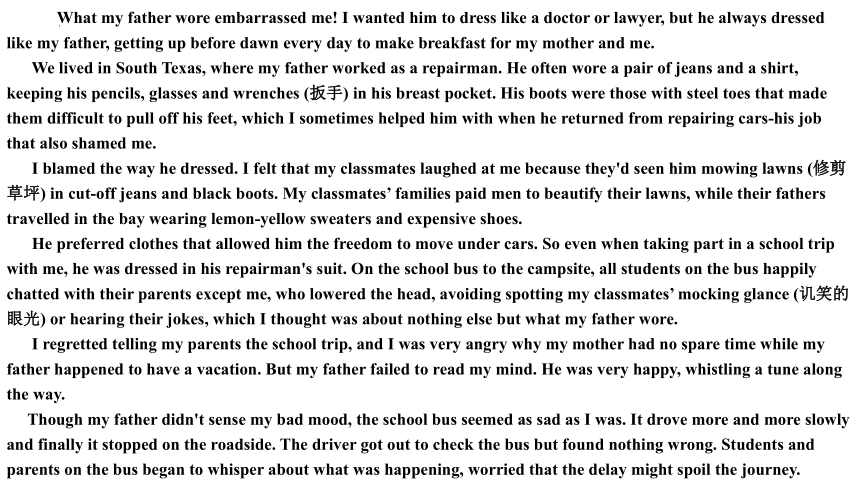
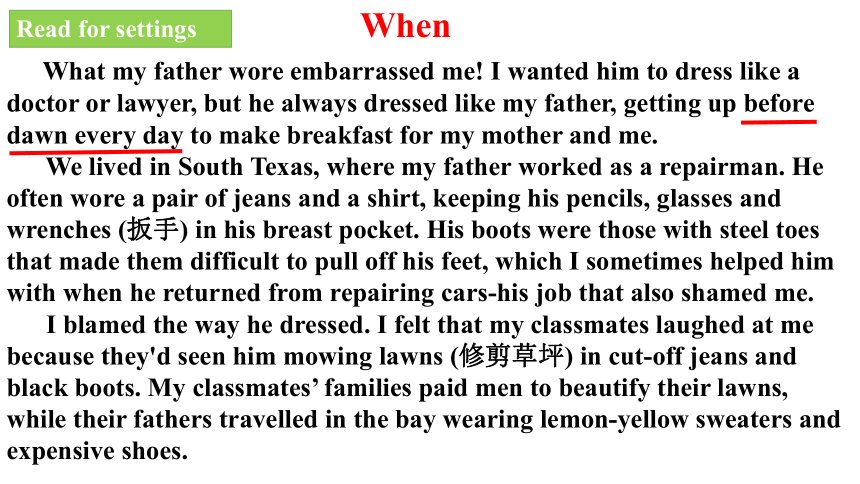

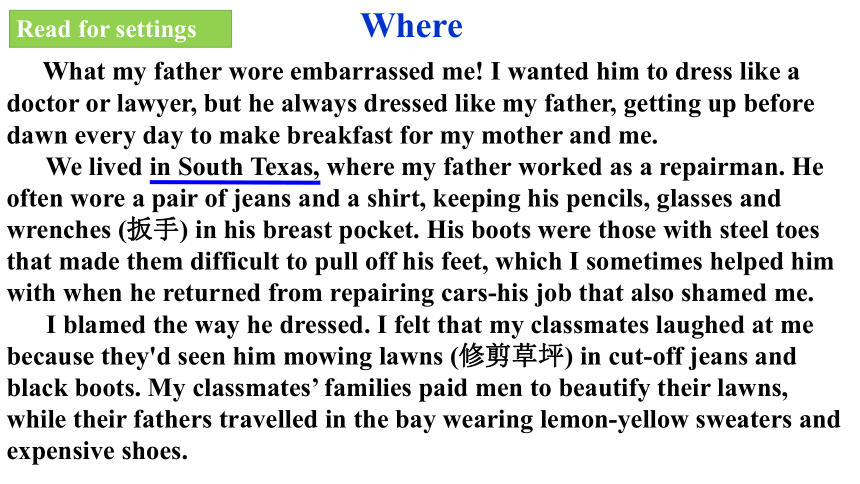
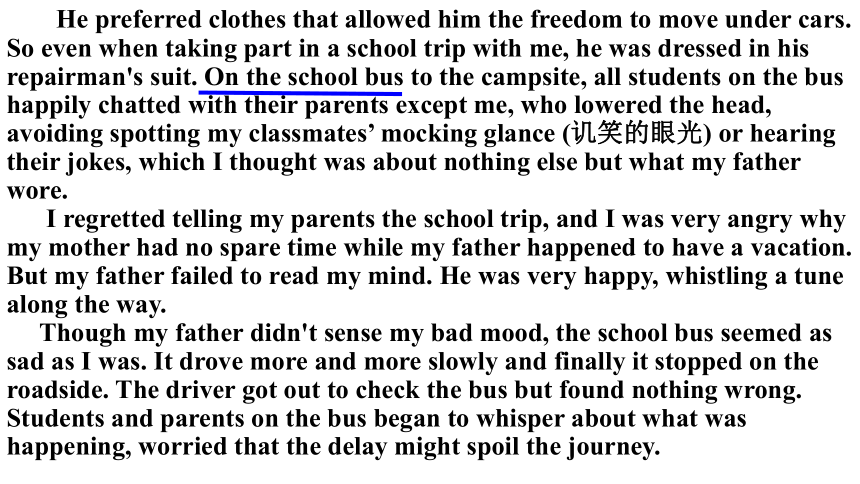
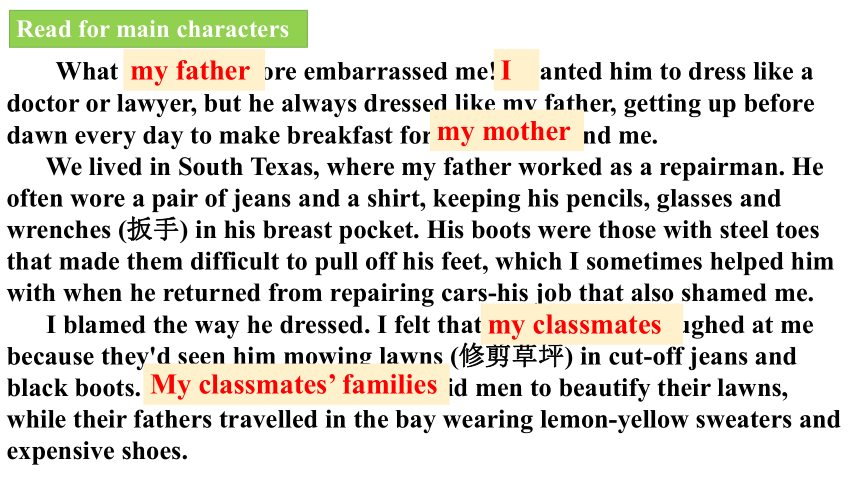
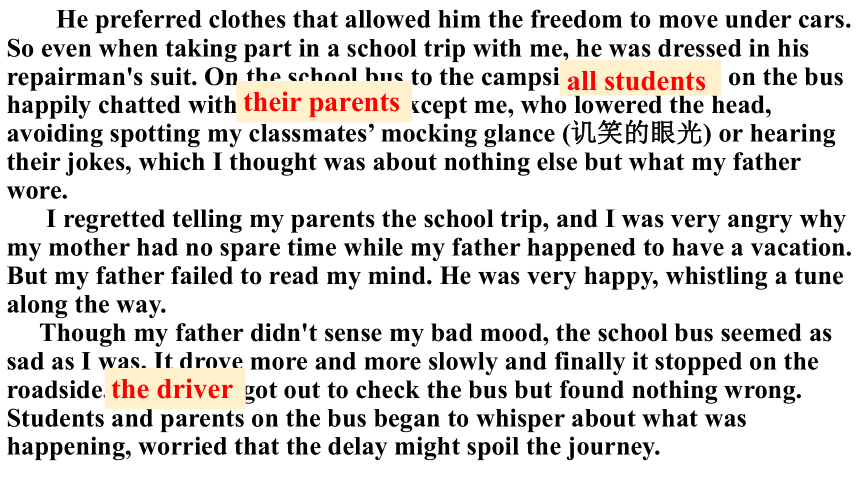
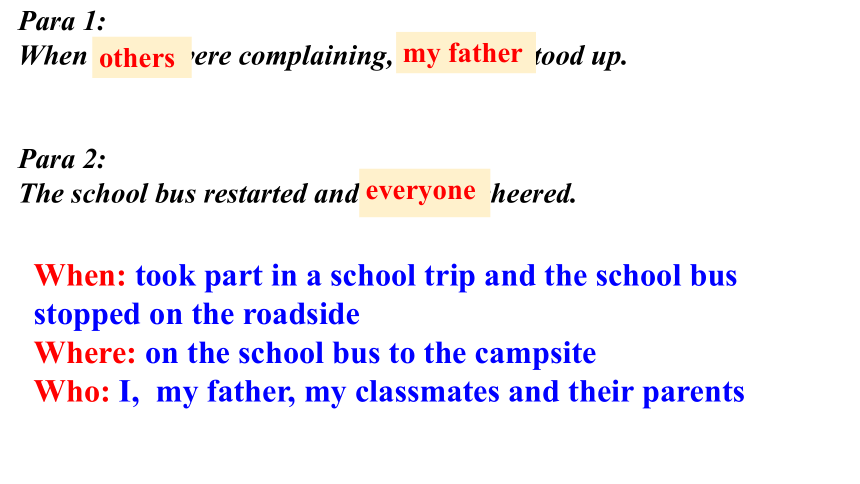
文档简介
(共20张PPT)
读 后 续 写
穿工装的爸爸让我转耻为荣
What my father wore embarrassed me! I wanted him to dress like a doctor or lawyer, but he always dressed like my father, getting up before dawn every day to make breakfast for my mother and me.
We lived in South Texas, where my father worked as a repairman. He often wore a pair of jeans and a shirt, keeping his pencils, glasses and wrenches (扳手) in his breast pocket. His boots were those with steel toes that made them difficult to pull off his feet, which I sometimes helped him with when he returned from repairing cars-his job that also shamed me.
I blamed the way he dressed. I felt that my classmates laughed at me because they'd seen him mowing lawns (修剪草坪) in cut-off jeans and black boots. My classmates’ families paid men to beautify their lawns, while their fathers travelled in the bay wearing lemon-yellow sweaters and expensive shoes.
He preferred clothes that allowed him the freedom to move under cars. So even when taking part in a school trip with me, he was dressed in his repairman's suit. On the school bus to the campsite, all students on the bus happily chatted with their parents except me, who lowered the head, avoiding spotting my classmates’ mocking glance (讥笑的眼光) or hearing their jokes, which I thought was about nothing else but what my father wore.
I regretted telling my parents the school trip, and I was very angry why my mother had no spare time while my father happened to have a vacation. But my father failed to read my mind. He was very happy, whistling a tune along the way.
Though my father didn't sense my bad mood, the school bus seemed as sad as I was. It drove more and more slowly and finally it stopped on the roadside. The driver got out to check the bus but found nothing wrong. Students and parents on the bus began to whisper about what was happening, worried that the delay might spoil the journey.
Read for settings
What my father wore embarrassed me! I wanted him to dress like a doctor or lawyer, but he always dressed like my father, getting up before dawn every day to make breakfast for my mother and me.
We lived in South Texas, where my father worked as a repairman. He often wore a pair of jeans and a shirt, keeping his pencils, glasses and wrenches (扳手) in his breast pocket. His boots were those with steel toes that made them difficult to pull off his feet, which I sometimes helped him with when he returned from repairing cars-his job that also shamed me.
I blamed the way he dressed. I felt that my classmates laughed at me because they'd seen him mowing lawns (修剪草坪) in cut-off jeans and black boots. My classmates’ families paid men to beautify their lawns, while their fathers travelled in the bay wearing lemon-yellow sweaters and expensive shoes.
When
He preferred clothes that allowed him the freedom to move under cars. So even when taking part in a school trip with me, he was dressed in his repairman's suit. On the school bus to the campsite, all students on the bus happily chatted with their parents except me, who lowered the head, avoiding spotting my classmates’ mocking glance (讥笑的眼光) or hearing their jokes, which I thought was about nothing else but what my father wore.
I regretted telling my parents the school trip, and I was very angry why my mother had no spare time while my father happened to have a vacation. But my father failed to read my mind. He was very happy, whistling a tune along the way.
Though my father didn't sense my bad mood, the school bus seemed as sad as I was. It drove more and more slowly and finally it stopped on the roadside. The driver got out to check the bus but found nothing wrong. Students and parents on the bus began to whisper about what was happening, worried that the delay might spoil the journey.
Read for settings
What my father wore embarrassed me! I wanted him to dress like a doctor or lawyer, but he always dressed like my father, getting up before dawn every day to make breakfast for my mother and me.
We lived in South Texas, where my father worked as a repairman. He often wore a pair of jeans and a shirt, keeping his pencils, glasses and wrenches (扳手) in his breast pocket. His boots were those with steel toes that made them difficult to pull off his feet, which I sometimes helped him with when he returned from repairing cars-his job that also shamed me.
I blamed the way he dressed. I felt that my classmates laughed at me because they'd seen him mowing lawns (修剪草坪) in cut-off jeans and black boots. My classmates’ families paid men to beautify their lawns, while their fathers travelled in the bay wearing lemon-yellow sweaters and expensive shoes.
Where
He preferred clothes that allowed him the freedom to move under cars. So even when taking part in a school trip with me, he was dressed in his repairman's suit. On the school bus to the campsite, all students on the bus happily chatted with their parents except me, who lowered the head, avoiding spotting my classmates’ mocking glance (讥笑的眼光) or hearing their jokes, which I thought was about nothing else but what my father wore.
I regretted telling my parents the school trip, and I was very angry why my mother had no spare time while my father happened to have a vacation. But my father failed to read my mind. He was very happy, whistling a tune along the way.
Though my father didn't sense my bad mood, the school bus seemed as sad as I was. It drove more and more slowly and finally it stopped on the roadside. The driver got out to check the bus but found nothing wrong. Students and parents on the bus began to whisper about what was happening, worried that the delay might spoil the journey.
Read for main characters
What my father wore embarrassed me! I wanted him to dress like a doctor or lawyer, but he always dressed like my father, getting up before dawn every day to make breakfast for my mother and me.
We lived in South Texas, where my father worked as a repairman. He often wore a pair of jeans and a shirt, keeping his pencils, glasses and wrenches (扳手) in his breast pocket. His boots were those with steel toes that made them difficult to pull off his feet, which I sometimes helped him with when he returned from repairing cars-his job that also shamed me.
I blamed the way he dressed. I felt that my classmates laughed at me because they'd seen him mowing lawns (修剪草坪) in cut-off jeans and black boots. My classmates’ families paid men to beautify their lawns, while their fathers travelled in the bay wearing lemon-yellow sweaters and expensive shoes.
my father
I
my mother
my classmates
My classmates’ families
He preferred clothes that allowed him the freedom to move under cars. So even when taking part in a school trip with me, he was dressed in his repairman's suit. On the school bus to the campsite, all students on the bus happily chatted with their parents except me, who lowered the head, avoiding spotting my classmates’ mocking glance (讥笑的眼光) or hearing their jokes, which I thought was about nothing else but what my father wore.
I regretted telling my parents the school trip, and I was very angry why my mother had no spare time while my father happened to have a vacation. But my father failed to read my mind. He was very happy, whistling a tune along the way.
Though my father didn't sense my bad mood, the school bus seemed as sad as I was. It drove more and more slowly and finally it stopped on the roadside. The driver got out to check the bus but found nothing wrong. Students and parents on the bus began to whisper about what was happening, worried that the delay might spoil the journey.
all students
their parents
the driver
Para 1:
When others were complaining, my father stood up.
Para 2:
The school bus restarted and everyone cheered.
others
my father
everyone
When: took part in a school trip and the school bus stopped on the roadside
Where: on the school bus to the campsite
Who: I, my father, my classmates and their parents
Background
Rising action
Climax
Falling action
Ending
Para 1 : When others were complaining,
my father stood up.
Para.2: The school bus restarted and
everyone cheered.
The way my father dresses and his job embarrassed me.
My father accompanied me on the school trip but I thought my classmates seemed to mock the way my father wore.
ashamed,
regretted
The school bus broke down halfway and we all worried the delay may spoil the journey.
Sad,
worried
embarrassed
Read for the plot
Read for conflict
What my father wore and his job embarrassed me.
The school bus broke down halfway and we were worried the delay might spoil the journey.
Read for the theme
[人与自我]
The standard of judging a person is not the dress, but the behavior and ability.
My father repaired the school bus and it restarted.
I changed my attitude to my father.
Solution
四句定框架
Paragraph 1: When others were complaining, my father stood up.
①___________________________________
②_______________________________________
Paragraph 2: The school bus restarted and everyone cheered.
③___________________________________________________
④___________________________________________________
按照“主位推进”确定段落主角
按照“主位推进”确定段落主角并升华主题
(过渡句)上下情节的衔接
(结尾句)正能量且与主题保持一致
主位推进:上句与下句的连接中,由已知信息带出未知信息,句句承接。
After what seemed like hours, he stood up with heavy sweats, waving his arm and signaling the driver to start the bus .
Thunderous applause erupted among the students and parents, words of thanks echoing on the bus.
Never before had I felt so proud of my father!
“Let me have a go.” Before I could stop him, he had approached the driver, explained that he was a repairman and offered to help.
Para. 1 When others were complaining, my father stood up.
Para. 2. The school bus restarted and everyone cheered.
What did my father do
How did other people react
Would my father fix the car successfully
How did my classmates and their parents react
How did I feel
Theme: What did I learn from this experience
Work out the plotline
Action- Response 原则
Action- Response 原则
Negative-Positve 原则
Conflict-Solution 原则
When others were complaining, my father stood up. “Let me have a go.” Before I could stop him, he had approached the driver, explained that he was a repairman and offered to help. Seeing him take out a wrench and crawl under the car, I could feel my face burning with shame and embarrassment. But the following moments witnessed him moving under the bus flexibly and having the bus checked and fixed with evident proficiency and expertise. After what seemed like hours, he stood up with heavy sweats, waving his arm and signaling the driver to start the bus .
The school bus restarted and everyone cheered. Thunderous applause erupted among the students and parents, words of thanks echoing on the bus. “Hey, your father’s so cool!” The boy before me turned around and his words gained wide approval from other students, their eyes twinkling with admiration. Dumbfounded, I just sat there, looking at my father coming near with a broad smile. His suit was dotted with dirty stains, but was glowing in the bright sunlight. He looked like a superman with his cape! (178 words)
范文
What’s your opinion about a second child
作文分档标准及解读
What’s your opinion about a second child
第四档 (16-20分) 创造了比较丰富、合理的内容,比较有逻辑性,续写比较完整,与原文情境融洽度较高。 使用了比较多样并且恰当的词汇和语法结构,可能有些许错误,但不影响理解。 比较有效地使用了语句间衔接手段,全文结构比较清晰,意义比较连贯。 内容较为丰富,逻辑线比较清晰且符合生活常识;续写内容较为合理且与原文关联较为紧密,构成了比较完整的故事。
所使用的语法结构和词汇虽然缺乏较高的丰富性和多样性,但大部分都正确,个别错误不影响理解文意。
基本有效地使用了连接成分,使文章不是很松散,篇章具有一定的紧凑性。
作文分档标准及解读
What’s your opinion about a second child
第三档 (11-15分) 创造了基本合理的内容,有一定的逻辑性,续写基本完整,与原文情境相关。 使用了简单的词汇和语法结构,有一些错误或不恰当之处,但基本不影响理解。 基本有效地使用了语句间衔接手段,全文结构基本清晰,意义基本连贯。 内容缺乏生动性,逻辑线存在但不明显;续写内容基本合理且与原文相关,可以构成一个比较完整的故事。
较为合理地使用了基本的词汇和语法,但表达方式较为单一,存在一定的错误,对理解可能造成影响。
不是所有的连接成分都具备,只是使用了必备的连接成分和过渡语,使文章不是很松散,篇章具有一定的紧凑性。
作文分档标准及解读
What’s your opinion about a second child
第二档 (6-10分) 内容或逻辑上有一些重大问题,续写不够完整,与原文情境有一定程度脱节。 所使用的词汇有限,语法结构单调,错误较多,影响理解。 未能有效地使用语句间衔接手段,全文结构不够清晰,意义不够连贯。 内容和逻辑存在较为严重的不合理性;续写内容完整性不佳,续写方向与原文关联度较浅。
没有丰富的表达和变化,其中一些词汇和语法的错误及不准确性,影响了写作任务的完成,不能够清楚地表达作者想要表达的内容。
基本没有连接成分,文段的呈现是简单的句子罗列,影响了文章结构的清晰性。
作文分档标准及解读
What’s your opinion about a second child
第一档 (1-5分) 内容或逻辑上有较多重大问题,或有部分内容抄自原文,续写不完整,与原文情境基本脱节。 所使用的词汇非常有限,语法结构单调,错误很多,严重影响理解。 几乎没有使用语句间衔接手段,全文结构不清晰,意义不连贯。 内容和逻辑存在严重的不合理性,或者直接摘抄原文的句子;续写内容不完整,续写方向与原文无关。
只是使用了非常基本且单调的语法结构和词汇表达,表达的错误使读者不知所云。
没有连接成分,文段只是句子的堆砌,支离破碎。
0分 所写内容太少或无法看清以致无法评判;所写内容全部抄自原文或与题目要求完全不相关。未作答。 空白卷;续写内容不成句子;书写太差影响识别;内容全部抄自原文;所写内容与题目无关。
读 后 续 写
穿工装的爸爸让我转耻为荣
What my father wore embarrassed me! I wanted him to dress like a doctor or lawyer, but he always dressed like my father, getting up before dawn every day to make breakfast for my mother and me.
We lived in South Texas, where my father worked as a repairman. He often wore a pair of jeans and a shirt, keeping his pencils, glasses and wrenches (扳手) in his breast pocket. His boots were those with steel toes that made them difficult to pull off his feet, which I sometimes helped him with when he returned from repairing cars-his job that also shamed me.
I blamed the way he dressed. I felt that my classmates laughed at me because they'd seen him mowing lawns (修剪草坪) in cut-off jeans and black boots. My classmates’ families paid men to beautify their lawns, while their fathers travelled in the bay wearing lemon-yellow sweaters and expensive shoes.
He preferred clothes that allowed him the freedom to move under cars. So even when taking part in a school trip with me, he was dressed in his repairman's suit. On the school bus to the campsite, all students on the bus happily chatted with their parents except me, who lowered the head, avoiding spotting my classmates’ mocking glance (讥笑的眼光) or hearing their jokes, which I thought was about nothing else but what my father wore.
I regretted telling my parents the school trip, and I was very angry why my mother had no spare time while my father happened to have a vacation. But my father failed to read my mind. He was very happy, whistling a tune along the way.
Though my father didn't sense my bad mood, the school bus seemed as sad as I was. It drove more and more slowly and finally it stopped on the roadside. The driver got out to check the bus but found nothing wrong. Students and parents on the bus began to whisper about what was happening, worried that the delay might spoil the journey.
Read for settings
What my father wore embarrassed me! I wanted him to dress like a doctor or lawyer, but he always dressed like my father, getting up before dawn every day to make breakfast for my mother and me.
We lived in South Texas, where my father worked as a repairman. He often wore a pair of jeans and a shirt, keeping his pencils, glasses and wrenches (扳手) in his breast pocket. His boots were those with steel toes that made them difficult to pull off his feet, which I sometimes helped him with when he returned from repairing cars-his job that also shamed me.
I blamed the way he dressed. I felt that my classmates laughed at me because they'd seen him mowing lawns (修剪草坪) in cut-off jeans and black boots. My classmates’ families paid men to beautify their lawns, while their fathers travelled in the bay wearing lemon-yellow sweaters and expensive shoes.
When
He preferred clothes that allowed him the freedom to move under cars. So even when taking part in a school trip with me, he was dressed in his repairman's suit. On the school bus to the campsite, all students on the bus happily chatted with their parents except me, who lowered the head, avoiding spotting my classmates’ mocking glance (讥笑的眼光) or hearing their jokes, which I thought was about nothing else but what my father wore.
I regretted telling my parents the school trip, and I was very angry why my mother had no spare time while my father happened to have a vacation. But my father failed to read my mind. He was very happy, whistling a tune along the way.
Though my father didn't sense my bad mood, the school bus seemed as sad as I was. It drove more and more slowly and finally it stopped on the roadside. The driver got out to check the bus but found nothing wrong. Students and parents on the bus began to whisper about what was happening, worried that the delay might spoil the journey.
Read for settings
What my father wore embarrassed me! I wanted him to dress like a doctor or lawyer, but he always dressed like my father, getting up before dawn every day to make breakfast for my mother and me.
We lived in South Texas, where my father worked as a repairman. He often wore a pair of jeans and a shirt, keeping his pencils, glasses and wrenches (扳手) in his breast pocket. His boots were those with steel toes that made them difficult to pull off his feet, which I sometimes helped him with when he returned from repairing cars-his job that also shamed me.
I blamed the way he dressed. I felt that my classmates laughed at me because they'd seen him mowing lawns (修剪草坪) in cut-off jeans and black boots. My classmates’ families paid men to beautify their lawns, while their fathers travelled in the bay wearing lemon-yellow sweaters and expensive shoes.
Where
He preferred clothes that allowed him the freedom to move under cars. So even when taking part in a school trip with me, he was dressed in his repairman's suit. On the school bus to the campsite, all students on the bus happily chatted with their parents except me, who lowered the head, avoiding spotting my classmates’ mocking glance (讥笑的眼光) or hearing their jokes, which I thought was about nothing else but what my father wore.
I regretted telling my parents the school trip, and I was very angry why my mother had no spare time while my father happened to have a vacation. But my father failed to read my mind. He was very happy, whistling a tune along the way.
Though my father didn't sense my bad mood, the school bus seemed as sad as I was. It drove more and more slowly and finally it stopped on the roadside. The driver got out to check the bus but found nothing wrong. Students and parents on the bus began to whisper about what was happening, worried that the delay might spoil the journey.
Read for main characters
What my father wore embarrassed me! I wanted him to dress like a doctor or lawyer, but he always dressed like my father, getting up before dawn every day to make breakfast for my mother and me.
We lived in South Texas, where my father worked as a repairman. He often wore a pair of jeans and a shirt, keeping his pencils, glasses and wrenches (扳手) in his breast pocket. His boots were those with steel toes that made them difficult to pull off his feet, which I sometimes helped him with when he returned from repairing cars-his job that also shamed me.
I blamed the way he dressed. I felt that my classmates laughed at me because they'd seen him mowing lawns (修剪草坪) in cut-off jeans and black boots. My classmates’ families paid men to beautify their lawns, while their fathers travelled in the bay wearing lemon-yellow sweaters and expensive shoes.
my father
I
my mother
my classmates
My classmates’ families
He preferred clothes that allowed him the freedom to move under cars. So even when taking part in a school trip with me, he was dressed in his repairman's suit. On the school bus to the campsite, all students on the bus happily chatted with their parents except me, who lowered the head, avoiding spotting my classmates’ mocking glance (讥笑的眼光) or hearing their jokes, which I thought was about nothing else but what my father wore.
I regretted telling my parents the school trip, and I was very angry why my mother had no spare time while my father happened to have a vacation. But my father failed to read my mind. He was very happy, whistling a tune along the way.
Though my father didn't sense my bad mood, the school bus seemed as sad as I was. It drove more and more slowly and finally it stopped on the roadside. The driver got out to check the bus but found nothing wrong. Students and parents on the bus began to whisper about what was happening, worried that the delay might spoil the journey.
all students
their parents
the driver
Para 1:
When others were complaining, my father stood up.
Para 2:
The school bus restarted and everyone cheered.
others
my father
everyone
When: took part in a school trip and the school bus stopped on the roadside
Where: on the school bus to the campsite
Who: I, my father, my classmates and their parents
Background
Rising action
Climax
Falling action
Ending
Para 1 : When others were complaining,
my father stood up.
Para.2: The school bus restarted and
everyone cheered.
The way my father dresses and his job embarrassed me.
My father accompanied me on the school trip but I thought my classmates seemed to mock the way my father wore.
ashamed,
regretted
The school bus broke down halfway and we all worried the delay may spoil the journey.
Sad,
worried
embarrassed
Read for the plot
Read for conflict
What my father wore and his job embarrassed me.
The school bus broke down halfway and we were worried the delay might spoil the journey.
Read for the theme
[人与自我]
The standard of judging a person is not the dress, but the behavior and ability.
My father repaired the school bus and it restarted.
I changed my attitude to my father.
Solution
四句定框架
Paragraph 1: When others were complaining, my father stood up.
①___________________________________
②_______________________________________
Paragraph 2: The school bus restarted and everyone cheered.
③___________________________________________________
④___________________________________________________
按照“主位推进”确定段落主角
按照“主位推进”确定段落主角并升华主题
(过渡句)上下情节的衔接
(结尾句)正能量且与主题保持一致
主位推进:上句与下句的连接中,由已知信息带出未知信息,句句承接。
After what seemed like hours, he stood up with heavy sweats, waving his arm and signaling the driver to start the bus .
Thunderous applause erupted among the students and parents, words of thanks echoing on the bus.
Never before had I felt so proud of my father!
“Let me have a go.” Before I could stop him, he had approached the driver, explained that he was a repairman and offered to help.
Para. 1 When others were complaining, my father stood up.
Para. 2. The school bus restarted and everyone cheered.
What did my father do
How did other people react
Would my father fix the car successfully
How did my classmates and their parents react
How did I feel
Theme: What did I learn from this experience
Work out the plotline
Action- Response 原则
Action- Response 原则
Negative-Positve 原则
Conflict-Solution 原则
When others were complaining, my father stood up. “Let me have a go.” Before I could stop him, he had approached the driver, explained that he was a repairman and offered to help. Seeing him take out a wrench and crawl under the car, I could feel my face burning with shame and embarrassment. But the following moments witnessed him moving under the bus flexibly and having the bus checked and fixed with evident proficiency and expertise. After what seemed like hours, he stood up with heavy sweats, waving his arm and signaling the driver to start the bus .
The school bus restarted and everyone cheered. Thunderous applause erupted among the students and parents, words of thanks echoing on the bus. “Hey, your father’s so cool!” The boy before me turned around and his words gained wide approval from other students, their eyes twinkling with admiration. Dumbfounded, I just sat there, looking at my father coming near with a broad smile. His suit was dotted with dirty stains, but was glowing in the bright sunlight. He looked like a superman with his cape! (178 words)
范文
What’s your opinion about a second child
作文分档标准及解读
What’s your opinion about a second child
第四档 (16-20分) 创造了比较丰富、合理的内容,比较有逻辑性,续写比较完整,与原文情境融洽度较高。 使用了比较多样并且恰当的词汇和语法结构,可能有些许错误,但不影响理解。 比较有效地使用了语句间衔接手段,全文结构比较清晰,意义比较连贯。 内容较为丰富,逻辑线比较清晰且符合生活常识;续写内容较为合理且与原文关联较为紧密,构成了比较完整的故事。
所使用的语法结构和词汇虽然缺乏较高的丰富性和多样性,但大部分都正确,个别错误不影响理解文意。
基本有效地使用了连接成分,使文章不是很松散,篇章具有一定的紧凑性。
作文分档标准及解读
What’s your opinion about a second child
第三档 (11-15分) 创造了基本合理的内容,有一定的逻辑性,续写基本完整,与原文情境相关。 使用了简单的词汇和语法结构,有一些错误或不恰当之处,但基本不影响理解。 基本有效地使用了语句间衔接手段,全文结构基本清晰,意义基本连贯。 内容缺乏生动性,逻辑线存在但不明显;续写内容基本合理且与原文相关,可以构成一个比较完整的故事。
较为合理地使用了基本的词汇和语法,但表达方式较为单一,存在一定的错误,对理解可能造成影响。
不是所有的连接成分都具备,只是使用了必备的连接成分和过渡语,使文章不是很松散,篇章具有一定的紧凑性。
作文分档标准及解读
What’s your opinion about a second child
第二档 (6-10分) 内容或逻辑上有一些重大问题,续写不够完整,与原文情境有一定程度脱节。 所使用的词汇有限,语法结构单调,错误较多,影响理解。 未能有效地使用语句间衔接手段,全文结构不够清晰,意义不够连贯。 内容和逻辑存在较为严重的不合理性;续写内容完整性不佳,续写方向与原文关联度较浅。
没有丰富的表达和变化,其中一些词汇和语法的错误及不准确性,影响了写作任务的完成,不能够清楚地表达作者想要表达的内容。
基本没有连接成分,文段的呈现是简单的句子罗列,影响了文章结构的清晰性。
作文分档标准及解读
What’s your opinion about a second child
第一档 (1-5分) 内容或逻辑上有较多重大问题,或有部分内容抄自原文,续写不完整,与原文情境基本脱节。 所使用的词汇非常有限,语法结构单调,错误很多,严重影响理解。 几乎没有使用语句间衔接手段,全文结构不清晰,意义不连贯。 内容和逻辑存在严重的不合理性,或者直接摘抄原文的句子;续写内容不完整,续写方向与原文无关。
只是使用了非常基本且单调的语法结构和词汇表达,表达的错误使读者不知所云。
没有连接成分,文段只是句子的堆砌,支离破碎。
0分 所写内容太少或无法看清以致无法评判;所写内容全部抄自原文或与题目要求完全不相关。未作答。 空白卷;续写内容不成句子;书写太差影响识别;内容全部抄自原文;所写内容与题目无关。
